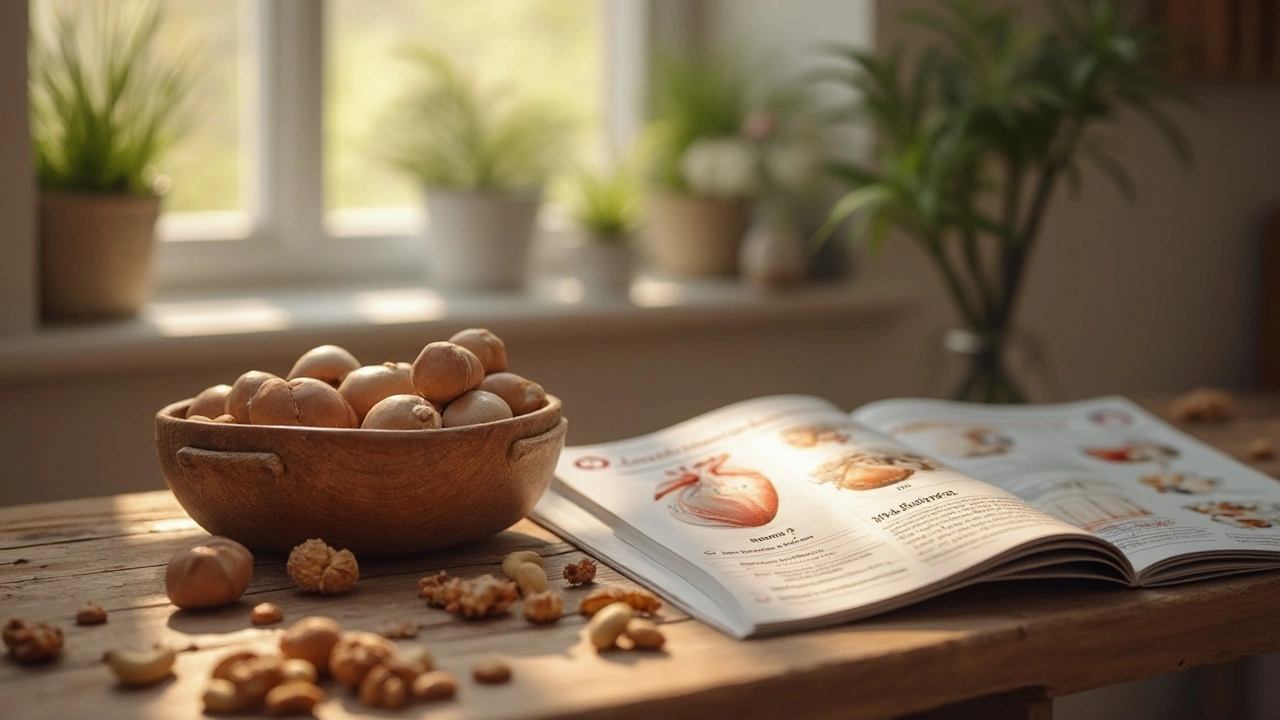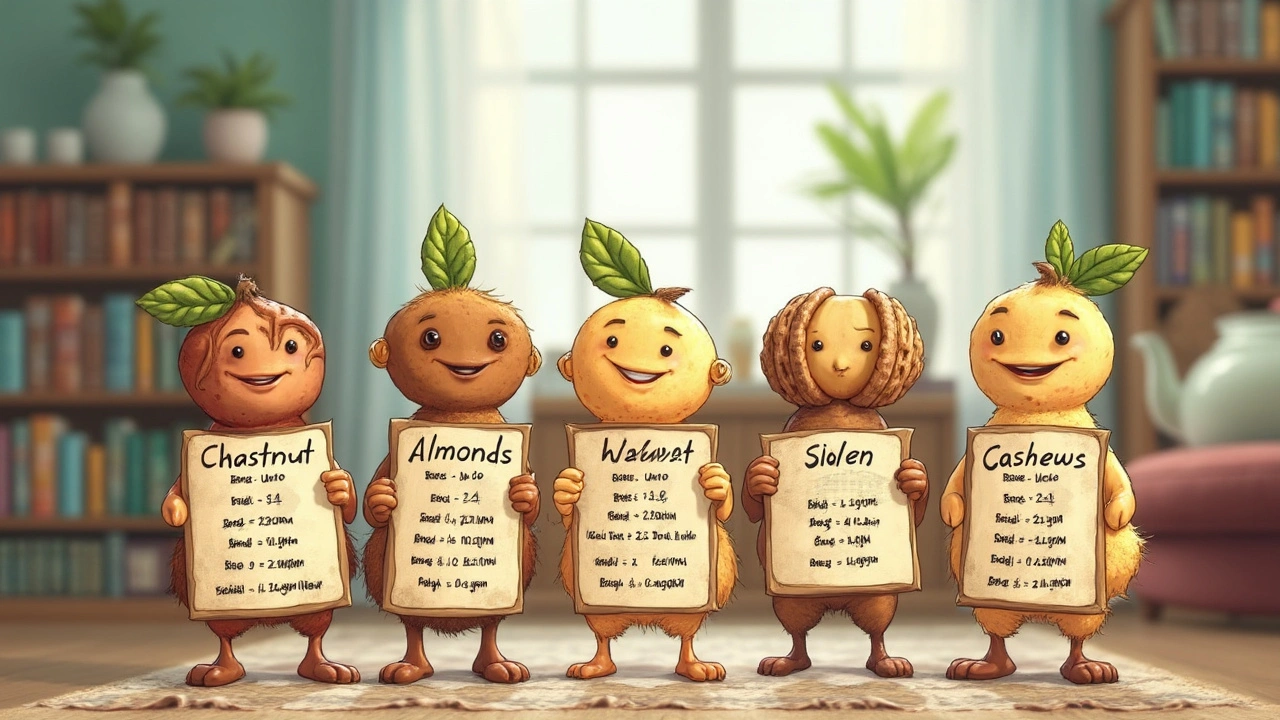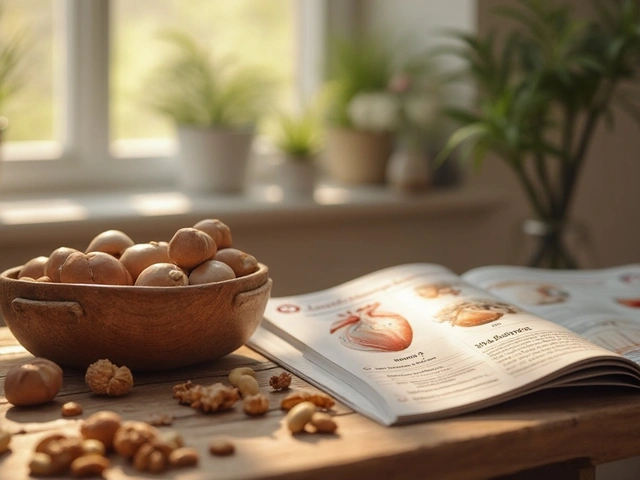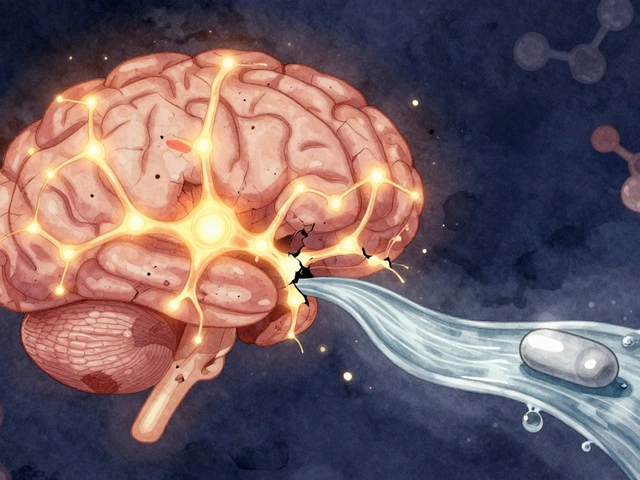26
Chestnuts vs Other Nuts: Fatty Acids & Phytosterols for Heart Health

What Makes a Nut Heart-Healthy, Anyway?
Start talking about heart health, and somewhere in the conversation, nuts come up. Most people love munching almonds or walnuts, thinking, "Hey, I'm doing something good for my heart." But what does that really mean? It's all about the stuff inside—mainly unsaturated fats and phytosterols. Unsaturated fats, which include both monounsaturated and polyunsaturated fats, help lower LDL (the "bad") cholesterol levels. They basically sweep out the gunk from your arteries. Saturated fats, by contrast, are the ones you want less of, as they're known to raise cholesterol. Phytosterols sound fancy, but they're simple: natural compounds in plants that look a lot like cholesterol and can actually block it from being absorbed in your gut.
Not all nuts are created equal, though. The most common favorites like almonds, walnuts, pistachios, and, yes, chestnuts, each have their own unique nutrient profiles. Some nuts have a lot of fat, some a little. Some nuts are heavy in those superstar phytosterols, and others not so much. It might surprise you to learn that chestnuts are in a whole different league compared to walnuts or peanuts. They aren’t even technically classified as a “tree nut” in the same sense, which is why people with other nut allergies sometimes can eat chestnuts safely—though you should still check with an allergist if you’re unsure.
So what makes a nut or "nut-like" food a true heart hero? High unsaturated fat, low saturated fat, and a decent hit of phytosterols. Toss in a dash of antioxidants, and you've got a cardiovascular all-star. But the exact numbers do matter. If you dig into nutrition databases, you’ll find big gaps between what's in a chestnut compared to, say, a cashew. As a mom, I like to know if I'm handing Soren something that'll nurture his growing heart for the long haul. Are chestnuts the next heart health staple, or should we stick with the classics? Let's really compare what goes into each bite.
Chestnuts: Nutrition Oddballs or Secret Superfood?
Here’s a quick confession: for years, I walked past chestnuts at the market without a second glance. It turns out, I've been missing out. Chestnuts look like nuts, but their nutritional profile is a world apart. Most nuts get their calories from fat, but chestnuts are closer to a starchy root veggie—they have more carbs than fat, which immediately sets them apart.
Take a look at this: a 100-gram serving of roasted chestnuts brings only about 1–2 grams of fat (that’s shockingly low). Of that tiny amount, less than 0.3 grams is saturated fat, and the rest is unsaturated. This is a complete flip from most nuts, which pack 50–70 grams of fat per 100 grams (think almonds or walnuts), with a good chunk as unsaturated fat. Chestnuts, meanwhile, trade a high fat profile for complex carbs and fiber. But don’t let that scare you off—those carbs are mostly the slow-digesting type, which is good news for your blood sugar and your heart.
Now, what about their micronutrient bonus? Chestnuts pack vitamin C (most nuts don’t), and enough potassium to go toe-to-toe with a small banana. Potassium helps keep blood pressure in check, in case you needed another reason to care. There’s a secret weapon in chestnuts you might not expect: their phytosterol content, while not off the charts, is worth mentioning—especially when you consider how few calories and fat you’re taking in for each serving. According to the USDA database, chestnuts have about 24-26 mg of phytosterols per 100 grams. This is lower than some “power” nuts, but it's not nothing given the way most people eat them (as an extra, not a meal's main event).
And here’s a tip you might not expect: roasted chestnuts actually taste a bit sweet and make a snappy addition to salads or stews, especially if you're bored of the usual nut suspects. If you're still asking, are chestnuts good for you, spoiler—the answer is a firm yes, especially if you’re watching your fat intake or want a lower-calorie, heart-friendly snack that doesn’t taste like cardboard.

Fatty Acid Profiles: Chestnuts vs. Popular Snack Nuts
Ready for some number crunching? The heart of the nut-vs-nut debate comes down to fatty acids—are you getting mostly "good" fats or the ones your heart dreads? Let’s pull up the facts side by side:
| Nut (per 100g) | Total Fat | Saturated Fat | Monounsaturated Fat | Polyunsaturated Fat |
|---|---|---|---|---|
| Chestnuts | 1.0-2.0g | 0.3g | 0.5g | 0.2g |
| Almonds | 49g | 3.7g | 31g | 12g |
| Walnuts | 65g | 6g | 9g | 47g |
| Cashews | 44g | 8g | 24g | 8g |
| Pistachios | 45g | 5.5g | 24g | 14g |
Look at that difference! Chestnuts have almost no fat compared to these other nuts. This can be great if you’re after something filling but super light on calories. Here’s where context matters: if you need to lower your total fat, chestnuts are a game-changer. Otherwise, if you’re focusing purely on boosting your intake of those "good" unsaturated fats, almonds and walnuts lead the pack. Especially walnuts—their polyunsaturated fat is legendary, mainly for omega-3 (alpha-linolenic acid), a superstar for fighting inflammation and supporting heart rhythm stability.
The story flips if we’re thinking saturated fat—the one linked to higher LDL cholesterol. Chestnuts score again here: their saturated fat is a fraction of what’s in cashews or even almonds. That means you can snack worry-free, no calculator required. Personally, when I pack Soren’s snacks for school, I mix up chestnuts with a few almonds for crunch and balance. It collapses the guilt and keeps things interesting.
Tips for the kitchen: chestnuts blend beautifully in soups and spreads. I use them to add creaminess, not grease, to my favorite winter stews. If your heart (or waistline) could use a break, swap some fatty nuts for roasted chestnuts—your arteries might thank you.
Phytosterols: The Unsung Cholesterol Blockers
Let’s talk about the secret sauce in nuts—phytosterols. These plant compounds stand between you and dietary cholesterol absorption. Studies say just 2 grams of phytosterols a day could lower cholesterol by up to 10%. No single nut can give you that much, but building them in to your meals over the week? Absolutely doable.
So, how do these numbers compare?
- Chestnuts: 24–26 mg per 100g
- Almonds: about 120 mg per 100g
- Walnuts: 113 mg per 100g
- Cashews: 120 mg per 100g
- Pistachios: 214 mg per 100g
Kind of humbling for chestnuts—they’re on the low end. Pistachios are a clear winner here. But don’t overlook the context: when you count fat and calories per serving, chestnuts let you snack big without the extra baggage. Plus, you can mix your nuts, so you aren’t limited to just one source of phytosterols.
Something most people miss: phytosterols are mostly hanging out in the nut’s skin. So, when you buy nuts with the skin on (like raw almonds or fresh roasted chestnuts), you’re getting more bang for your buck. The real trick is variety. You don’t need to eat pistachios until you’re green in the face—spread out your choices through the week.
If you’re managing cholesterol the natural way, try this little experiment: swap a fatty snack (like chips or cheesy crackers) for a cup of roasted chestnuts two or three times a week. See how you feel, and maybe check those cholesterol numbers next time you’re at the doctor. Small changes quietly add up, I promise.

How to Work Chestnuts (and Other Nuts) into Your Heart-Healthy Diet
Reading all these numbers can make your head spin, but eating for heart health is a lot simpler if you know a few tricks. First, replace snacks that are full of saturated fat (pastries, chips, even some baked goods) with nuts or chestnuts. Especially chestnuts—they let you fill up with almost no fat, which helps if you’re watching your cholesterol or trying to control weight. Plus, their subtle sweetness can kill those sugar cravings before you raid the cookie jar.
It’s not just about changing snacks. Try tossing grilled chestnuts in salads to replace croutons, or blending them into creamy soups for a rich texture that doesn’t need butter or heavy cream. I melt chopped chestnuts into oatmeal for Soren—he loves it, and I know his heart is getting a boost. For older kids or adults, try mixing chestnuts with crunchy nuts like walnuts or pistachios. You get a blend of healthy fats, fiber, and phytosterols with more fun textures than eating a single nut over and over.
Watch your portions, though. With regular fatty nuts, a small handful (about 28–30g a day) is plenty. With chestnuts, you can eat more without the calorie avalanche—100g of roasted chestnuts is less than 250 calories and seriously filling. If you need grab-and-go snack ideas, keep a pouch of roasted chestnuts in your bag or stash them at your desk. They don’t spoil as fast as you’d think, and they squash the urge to buy less healthy vending machine snacks.
One more tip: If you’re adding nuts to your diet for health, go unsalted. Salted nuts might taste addictive, but the sodium can undo some of those heart-friendly benefits, especially if you already have blood pressure concerns. Keep it simple and let the nutty flavors shine.
If you’re skeptical about chestnuts (especially if they only pop up in holiday songs), remember they’re actually a staple in Mediterranean diets—places where heart health shines. Bonus tip: European chestnuts have even sparked some research into their role as a dietary supplement. If you’re still wondering, are chestnuts good for you, the emerging research and nutrition stats definitely make a case for giving them a regular try.
The real secret? Mix it up, adjust for your personal taste and health needs, and remember that "heart-healthy" isn’t a single food—it’s a pattern. Chestnuts might just be the gentle nudge your diet didn’t know it needed.




Matt Stone
July 18, 2025 AT 03:26Okay so chestnuts vs other nuts seriously? Did not expect chestnuts to even be in the same conversation.
But after reading the comparison on fatty acids and phytosterols, I'm curious about the actual heart benefits. I always thought walnuts were king when it came to omega-3s.
Does the article say chestnuts have comparable omega-3 or other heart-healthy fats? Seems like a big deal if they do.
Also what about phytosterols? How much protection do they actually provide compared to regular nut options? Any science backing that up?
Feels like an underrated snack if these benefits hold true.
Joy Luca
July 20, 2025 AT 07:06For real, chestnuts don’t get nearly enough credit. Their fatty acid profile is quite intriguing, especially because they are lower in fat overall but contain a good amount of unsaturated fats which are my go-to when thinking heart health.
The phytosterol content surprisingly holds ground against other nuts like almonds and cashews, which means they might contribute to lowering LDL cholesterol as well.
It's important to highlight how the different nut varieties contribute uniquely to cardiovascular health rather than just focusing on one.
And from what I gathered, chestnuts offer a unique mix of nutrients that can complement a heart-healthy diet, especially if you’re looking to diversify your nut intake.
Would love to see more research on this because in my opinion chestnuts definitely deserve more pantry space.
Jessica Martins
July 22, 2025 AT 10:46Approaching this objectively, the article appears to offer a comprehensive comparison between chestnuts and other nuts in terms of their fatty acid and phytosterol content.
It is noteworthy that despite chestnuts having a lower fat content overall, they present a unique profile of fatty acids beneficial to heart health.
The phytosterol analysis further substantiates the argument for chestnuts as a viable snack option for cardiovascular protection.
The inclusion of tips for incorporating chestnuts into one’s diet is a practical aspect that I found particularly useful.
Overall, the article seems thorough; I would recommend consulting it for precise nutrient values.
Gayatri Potdar
July 24, 2025 AT 14:26Anyone else feel like chestnuts are the sneaky heart-helpers the big nut corporations don’t want you to know about?
They shove almonds and walnuts down our throats but chestnuts quietly pack a punch with those fatty acids and phytosterols that mainstream ads never mention.
I'm telling you, the pharma-nut alliance is probably trying to keep chestnuts underrated so they can keep profiting on the usual suspects.
It’s time we wake up and diversify what’s in our nut bowls if we want genuine heart benefits and not some corporate sugarcoated hype.
Anyway this article kinda confirms what I suspected, chestnuts got those hidden benefits.
Marcella Kennedy
July 26, 2025 AT 18:06I really appreciate the attention the article gives to chestnuts, which are often overlooked but culturally significant in many parts of the world.
The detailed comparison of fatty acids and phytosterols makes me think about how incorporating a variety of nuts—not just the popular ones—can provide a broader spectrum of heart health benefits.
As someone who's always encouraging balanced nutrition, chestnuts seem like a lovely addition especially since they might offer unique nutrients that others don’t.
I'd love to hear from others about any personal experiences including chestnuts in their diets and if they've noticed any positive health effects!
It's refreshing to see an inclusive perspective on nuts, promoting dietary diversity rather than a one-size-fits-all approach.
Jamie Hogan
July 28, 2025 AT 21:46It strikes me as somewhat pedestrian to elevate chestnuts in this discussion, given their relatively low fat content compared to the likes of walnuts and almonds.
However, the phytosterol content is undeniably an intriguing facet that warrants further exploration.
One must question whether chestnuts can truly rival the superior omega-3 richness and antioxidant profiles of the more commonly praised nuts.
The article presumably touches on this, but I find myself sceptical of chestnuts' purported equivalency in terms of heart health advantages.
Nonetheless, a diversifying of one’s dietary nut intake seems hardly a poor recommendation, even if chestnuts serve as a mere supplementary addition.
April Rios
July 31, 2025 AT 01:26Honestly, the nuanced approach to understanding fatty acids and phytosterol content here is more than just nutrition talk — it’s a philosophical re-examination of how we view “healthy snacking.”
Chestnuts, often relegated to sidelined roles, challenge our paradigms about what counts as valuable food.
It’s fascinating because the lipid profiles in chestnuts might prompt us to reconsider the binary good/bad fat mentality that's pervasive in mainstream discourse.
Plus, the social and cultural implications of including diverse nuts like chestnuts in our diets might reflect a broader holistic commitment to heart health that transcends mere biochemistry.
Ultimately, this invites us to a deeper dialogue about food, health, and identity.
byron thierry
August 2, 2025 AT 05:06This comparison is fascinating and timely.
Chestnuts bring a mellow-but-effective profile of fatty acids that might be somewhat underestimated in the Western nut market, yet they're often a staple in other cultures.
The phytosterols they pack also contribute to cholesterol-lowering which is crucial for heart health.
I'm particularly keen on how the article highlights tangible tips for integrating chestnuts into daily diets which I believe promotes accessibility.
It’s about time more people paid attention to these humble nuts, not merely relying on the popular ones stacked on supermarket shelves.
The potential heart protection merits are definitely compelling.
bob zika
August 4, 2025 AT 08:46The detailed breakdown of fatty acids and phytosterols between chestnuts and typical nuts is invaluable.
I appreciate that the article doesn’t oversimplify the roles of different types of fats.
Chestnuts appear to offer a unique nutrient mixture that complements other nuts strategically.
This adds sophistication to making dietary choices based on evidence rather than hype.
It's encouraging to see a focus on the biochemical nuances that genuinely support heart health rather than blanket recommendations.
M Black
August 6, 2025 AT 12:26Woah gotta say, never even thought of chestnuts as a real contender when it comes to heart health.
Love that the article dives into all this fatty acid and phytosterol stuff, heart health is serious business and knowing what nuts actually do helps a ton.
Chestnuts seem less heavy on fat but still pack a punch with the good kinds.
Plus, they’re great in recipes or just roasted as a snack and not as common so you’d surprise your friends lol.
Gonna put some in my pantry for sure, thanks for the solid info!
Sidney Wachira
August 8, 2025 AT 16:06Honestly, seeing chestnuts even compared to cashews felt wild at first but the article convinced me.
I’m all about the drama of nutrition science and here it seems chestnuts hold their own with those phytosterols, which is huge for heart health drama-wise.
Plus the fatty acid breakdown was way more detailed than I expected, showing chestnuts aren’t just filler nuts.
Could be a backstage star in heart health snacks, certainly worth spotlight time for any health nut.
Love learning stuff like this, keeps snack time interesting :D